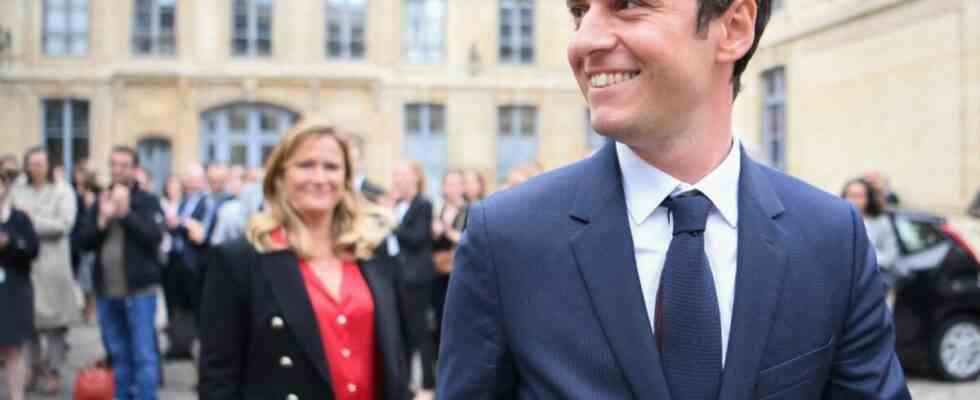The 43rd government of the Fifth Republic had a head since Monday, it now has a body. It is not equal, even counting the Prime Minister (14 men, 13 women) and above all men are in the vast majority among the ministers and deputy ministers. We take a look at what should be politically remembered from this new cast at the start of Emmanuel Macron’s second term, the composition of which is relatively stable compared to the previous one.
The winners and winners
The environmental “trident” will therefore be embodied by three women: Elisabeth Borne, therefore, at Matignon, assisted by Agnès Pannier-Runacher in Energy Transition and Amélie de Montchalin in Ecological Transition and Territorial Cohesion. These are two big promotions for these two very techno profiles, their actions and gestures will be scrutinized under the ecological turning point that Emmanuel Macron wants to give to his new mandate. Sébastien Lecornu, until now Minister of Overseas, takes a sovereign ministry with the strategic portfolio of the Armies.
Two other big promotions are to be noted in the Borne government: that of Olivier Dussopt, who goes to Labour. The former socialist therefore seems to be the one who will have to assume the retirement reform at age 65. And above all, Gabriel Attal confirms his status as a rising value of the macronie by becoming Minister Delegate for Public Accounts. This is the very example of the springboard ministry under the Fifth Republic. Gérald Darmanin, Valérie Pécresse, Bernard Cazeneuve, Nicolas Sarkozy, Alain Juppé, Laurent Fabius or Jacques Chirac passed there in their young ministerial years.
Executives
But overall, this new government is marked by great stability: 15 of the 27 members were already in the previous team. The Borne government gives pride of place to “executives”. This is found at the very top of the protocol order: in second place is Bruno Le Maire, who keeps the Economy and Gérald Darmanin, third, who keeps the Interior. More surprising: Eric Dupond-Mortetti remains in Justice and is even 5th in the protocol order. Franck Riester, in Foreign Trade, and Clément Beaune, in European Affairs, also remain in place. Let us note the small promotions of small effective hands of the government, like Marc Fesneau who passes from Relations with the Parliament to Agriculture. Also, Brigitte Bourguignon, kingpin of Macronie from the start, has access to a full-fledged ministry: that of Health and Prevention.
The surprise of the head (of state)
Like Nicolas Hulot in 2017 or Eric Dupond-Moretti in 2020, the Borne government has its “wow effect”: the appointment of Pap Ndiaye as Minister of National Education and Youth. The arrival of this historian, clearly marked on the left, at the head of the museum of the history of immigration in Paris, is a big surprise. Because he has no experience in politics, even less ministerial, but also politically. He represents, on many points, a sort of antithesis of the positions adopted over the past five years by his predecessor, Jean-Michel Blanquer.
The new minister is indeed quite far from his conceptions of very rigorous secularism, “wokism” or “Islamo-leftism” rampant in universities or even the intersectionality of feminist or anti-racist struggles. If the supporters of this line, rather close to the “Republican Spring”, are about to leave (El Haïry, Vidal), the future will tell if it is indeed a change of policy on these subjects for Emmanuel Macron, already a bit noticeable in the in-between round of the presidential election. Beyond that, getting to lead a ministry as huge as that of National Education will not be easy for a novice. The philosopher Luc Ferry had broken his teeth there twenty years ago.
The opening
The photo novel of the divorce between Damien Abad and the right found its epilogue on the steps of the Elysée: the former president of the LR group in the National Assembly was appointed Minister of Solidarity, Autonomy and People disabilities. It is the mark of a certain opening to the right. Apart from Pap Ndiaye, the entries come indeed rather from this camp. This is the case of the new Minister for Europe and Foreign Affairs, Catherine Colonna, long-time spokesperson for Jacques Chirac at the Elysée Palace, then Minister of Foreign Affairs at the end of her mandate. Ditto for Christophe Béchu who will take care of local authorities. Admittedly, unlike Damien Abad, the mayor of Angers had been approaching Macronie for a while now.
The losers and losers
We expected the departures of Marlène Schiappa (Citizenship), Barbara Pompili (Ecological Transition), Frédérique Vidal (Higher Education) and Jean-Michel Blanquer (National Education). For the latter, the appointment of Pap Ndiaye to his succession still passes for a disavowal of the political tone that he gave to his passage rue de Grenelle. Olivier Véran remains, but moves from Health – where he has been in the spotlight with the pandemic – to the more muted Ministry of Relations with Parliament. This can hardly be seen as a promotion… Same story for the general delegate of LREM Stanislas Guerini, who nevertheless enters the government, in the portfolio of the Public Service. But this entry looks like an exfiltration, perhaps after his polemical remarks on the candidacy of Jérôme Peyrat.
More surprising is the absence of Julien Denormandie, from the Macronist hard core in 2017 and Minister of Agriculture in the Castex team. He was however seen as a potential Prime Minister only a few weeks ago, or able to embody part of the “environmental trident” announced in Marseille by Emmanuel Macron. Julien Denormandie was one of the only ministers present, it had been interpreted as a sign.

